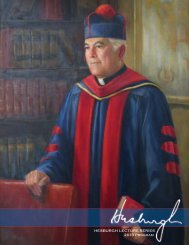HESBURGH LECTURE SERIES 2012 Program - Alumni Association ...
HESBURGH LECTURE SERIES 2012 Program - Alumni Association ...
HESBURGH LECTURE SERIES 2012 Program - Alumni Association ...
You also want an ePaper? Increase the reach of your titles
YUMPU automatically turns print PDFs into web optimized ePapers that Google loves.
Gary A. Anderson, Ph.D.<br />
Hesburgh Professor of Catholic Theology<br />
Biography<br />
Gary Anderson began his career as an ordained minister in the United Methodist Church<br />
before being received into the Catholic Church in the early 1990s. His interests concern the<br />
religion and literature of the Old Testament and the reception of this set of books in early<br />
Judaism and Christianity. He always has taken a strong interest in Jewish-Christian dialogue,<br />
and has spoken in churches and synagogues across the country. Anderson also has been a<br />
frequent guest in Israel. He has authored three books, co-edited three others, and written<br />
some 40 articles. Anderson has been awarded fellowships from the National Endowment for<br />
the Humanities, the Fulbright <strong>Program</strong>, the Institute for Advanced Studies at the Hebrew<br />
University in Jerusalem, the Center for Theological Inquiry at Princeton University, and the<br />
American Philosophical Society. Anderson also is a Henry Luce Fellow in Theology. His most<br />
recent book is Sin: A History (Yale, 2009).<br />
Lectures<br />
Faith and Finance<br />
The terrible credit crisis that has consumed much of the western world for the last five years or so has important ramifications<br />
for understanding the religious life. As many commentators have noted, the credit crisis is a crisis of belief. As such there are<br />
important parallels with the nature of religious life. This is in part grounded in our conventional vocabulary: the words “credit”<br />
and “creditor” come from the Latin, credere, which means “to believe.” Credere also is the root for words such as creed and<br />
credible. This lecture explores what the recent banking crisis can reveal about the nature of religious faith.<br />
Why I Became Catholic<br />
Anderson was born and raised United Methodist, and after getting his undergraduate degree at a fine Methodist college (Albion<br />
College in Albion, Mich.), he went to Duke Divinity School to prepare for the ministry. Along the way, he decided to change his<br />
academic path. Anderson eventually went on to get his doctorate in biblical studies. But he also decided to change his ecclesial<br />
affiliation, going from Methodist to Episcopalian (ever so briefly) to Roman Catholic. His desire to become Catholic began during<br />
his very first weeks in the seminary, yet it took nearly 15 years for him to actually make the change. In this lecture, Anderson<br />
addresses why he found the Roman Catholic Church so irresistible and also—somewhat paradoxically—why it took so long for<br />
him to join. He will comment on just what is so “cool” about becoming Catholic.<br />
8 The Hesburgh Lecture Series, <strong>2012</strong> <strong>Program</strong><br />
Categories<br />
Business, Church, Social<br />
Concerns, Spirituality



